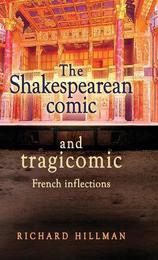
|
The Shakespearean Comic and Tragicomic: French Inflections
Hardback
Main Details
| Title |
The Shakespearean Comic and Tragicomic: French Inflections
|
| Authors and Contributors |
By (author) Richard Hillman
|
| Series | Manchester University Press |
|---|
| Physical Properties |
| Format:Hardback | | Pages:248 | | Dimensions(mm): Height 216,Width 138 |
|
| Category/Genre | Literary studies - c 1500 to c 1800 |
|---|
| ISBN/Barcode |
9781526144072
|
| Classifications | Dewey:822.33 |
|---|
| Audience | | Undergraduate | | Postgraduate, Research & Scholarly | |
|---|
|
Publishing Details |
| Publisher |
Manchester University Press
|
| Imprint |
Manchester University Press
|
| Publication Date |
17 January 2020 |
| Publication Country |
United Kingdom
|
Description
Richard Hillman's latest book on the French connections of early modern English drama shows that Shakespeare regularly inflected the models provided by Italian comedy and tragicomedy by evoking French material, dramatic and non-dramatic. Such inflection especially bears on the tragic overtones that menace or complicate comic resolutions. -- .
Author Biography
Richard Hillman is Professor Emeritus in Renaissance Literature at the Universite de Tours, Centre d'Etudes Superieures de la Renaissance, Tours, France -- .
Reviews'In sum, Hillman's The Shakespearean Comic and Tragicomic is a masterly study of intertextuality. It will become an important model for comparative literature specialists owing to its astute demonstration of evolving French and English theatrical forms and tastes. We are given a rich tapestry of ideas about narrative and dramatic romance circulating between France and England in the late sixteenth and early seventeenth centuries. Given the density of the argument deployed, the book should be savored over several sittings.' H-France Review 'This book provides valuable material for scholars interested in wide-ranging associations and influences. Its recalibration of French works in relation to Shakespeare's textual production (and Hillman's term 'inflections' is important in this respect) also makes the book an important intervention in comparative literary studies.' The Modern Language Review -- .
|